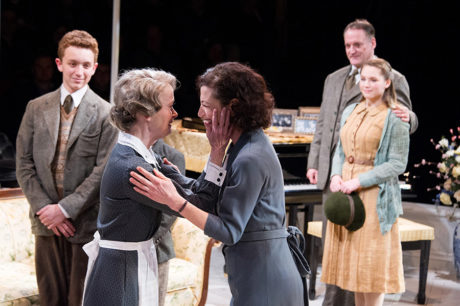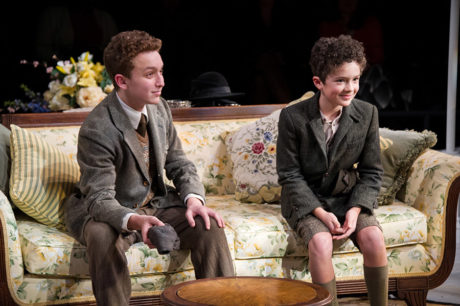Whatever this play meant to Broadway audiences when it debuted in 1941, just prior to America’s entry into a war of resistance to fascism abroad, what matters now is what it means to audiences just as America has entered a war of resistance to fascism here at home. Does Lillian Hellman’s principled script—now in a praiseworthy production on the waterfront at Arena Stage—stand the test of time? Does it warrant viewing, in other words, as a Watch on the Potomac?
Judging from audience response on opening night, the answer is yes.
The earliest and clearest evidence that Watch on the Rhine was landing with contemporary relevance came in an exchange between the young lawyer David Farrelly (Thomas Keegan) and the antifascist activist Kurt Müller (Andrew Long).

David’s mother Fanny Farrelly (Marsha Mason) is the wealthy widow whose sumptuous country estate near DC the play takes place in. It is 1940, and Kurt has arrived with his wife Sara Müller (Lise Bruneau), who is David’s beloved sister, and their three children. The Müller family have been on the run, because Kurt in his native Germany is an enemy of the state. And they have all been welcomed without reservation into the Farrelly home.
This is the line of David’s to Kurt that prompted a sudden and resounding round of applause:
You are a political refugee. We don’t turn back people like you, people in danger.
And boom. The exigency of sanctuary hit home in the house.
As the story unfolds, Hellman reveals Kurt’s antifascist conscience as if a beacon of bravery. “Here I stand, I can do no other,” Kurt quotes Martin Luther, the famous German resister to institutional religious tyranny. Kurt faces threats on his life, not only from Nazis but from a scoundrel houseguest, Teck De Brancovis (J Anthony Crane)—a plot that thickens harrowingly as the play proceeds. Kurt’s mother-in-law Fanny offers Kurt not only a wing of the house to stay in but some serious cash. She may be a checkbook liberal, but she appreciates what’s priceless about radical resistance. And through it all, Hellman paints a profoundly moving portrait of Kurt’s loving family standing by him—Sarah, of course, but also the three precocious kids.
I had an opportunity during rehearsals to interview the actors who portray those youngsters. I wanted to look at Watch on the Rhine through their eyes. The play is a combination light drawing room comedy and disturbing dark drama—like a specialty sandwich held together with mayonnaise that says a mouthful. So I was curious how they were wrapping their heads around it.
Two of the questions I asked were:
Watch on the Rhine takes place in 1940, shortly before the United States entered World War II. Your mother is American and your father is German. What do you think it means to your character that your father is against fascism and the Nazis?
And:
How can someone your age relate to the themes that are in Watch on the Rhine?
Their answers say as much about the present resonance of the play as did that round of grownup applause on opening night.

Sixteen-year-old Ethan Miller, who plays the oldest of the three siblings, said,
Joshua lived in Germany during the fascist regime and knows how dangerous fascism can be, and he has a great sense of patriotism for his father’s mission. Also he has a small sense of democracy, because his mother is American, which gives him more of a reason to stand behind his father’s work. There is also a great sense of fear involved, because it seems no matter where they go, fascism always seems to follow.
In the time period when this show takes place, very few people had the right to speak up about important world matters such as human rights. Among the excluded were children. They did not have a voice, and even if they did want to speak up, they were not allowed to. It is important for teens to see this show and appreciate how fortunate we are. Unlike in the show, teens today are able to be heard and to be seen, and can make a difference by speaking up instead of being silenced.
Fifteen-year-old Lucy Breedlove, who plays the middle child, said,
Babette grew up in Germany as fascism was on the rise. Due to the nature of her father’s job, she and her brothers have gotten used to a lifestyle where they’re constantly in fear that their family will be caught by the Nazis, even when they move to America.
Watch on the Rhine is timeless in that it combines the stories of a family reunion, a relationship, and a political feud. Despite being written in 1941, the themes are still relevant today because it focuses on a modern family that has complexities in all fields.
And eleven-year-old Tyler Bowman, a delightful scene stealer as the youngest, said,
Bodo feels that his father is doing the right thing even though it goes against his native country, and Bodo is proud of his father.
There are times when kids just do normal, everyday things like baseball, knitting, fixing things, etc., even though the world is changing.
As crisply directed by Jackie Maxwell as Watch on the Rhine is, there are some plot complications in Watch on the Rhine that don’t have a self-evident modern-day analog; as a result they can seem inscrutable. I overheard a couple minor comments to that effect, and I myself got perplexed at times. For instance, I didn’t exactly track Teck’s treachery (though Crane does villainy vividly) or the backstory of the twist that necessitates Kurt’s return to Germany (though the emotion when he says good-bye to his family was off the charts). But as the teens and tween quoted above can confirm, you can be underage and get what’s timeless here.
What comes through compellingly in Watch on the Rhine is its overarching narrative of resistance, persistence, and courage—and the need for solidarity as if we’re family. Suddenly the year 1940 and the year 2017 seem the same moment in perilous times. And Arena Stage has given us a show whose urgency is so relatable it aches.
Running Time: Two hours and 30 minutes, with one 15-minute intermission.
Watch on the Rhine plays February 3 to March 5, 2017, at Arena Stage’s Fichandler Stage – 1101 Sixth Street SW, in Washington DC. For tickets, call the box office at (202) 488-3300, or purchase tickets online.
LINKS:
Review: ‘Watch on the Rhine’ at Arena Stage by Robert Michael Oliver.
In the Moment: A Chat With Ethan Van Slyke on His Career and Understudying For ‘Watch On the Rhine’ at Arena Stage by David Siegel.
Interviews by John Stoltenberg on DCMetroTheaterArts:
Meet the Three Young Actors in ‘Watch on the Rhine’ at Arena Stage: #1 Ethan Miller.
Meet the Three Young Actors in ‘Watch on the Rhine’ at Arena Stage: #2 Tyler Bowman.
Meet the Three Young Actors in ‘Watch on the Rhine’ at Arena Stage: #3 Lucy Breedlove.





